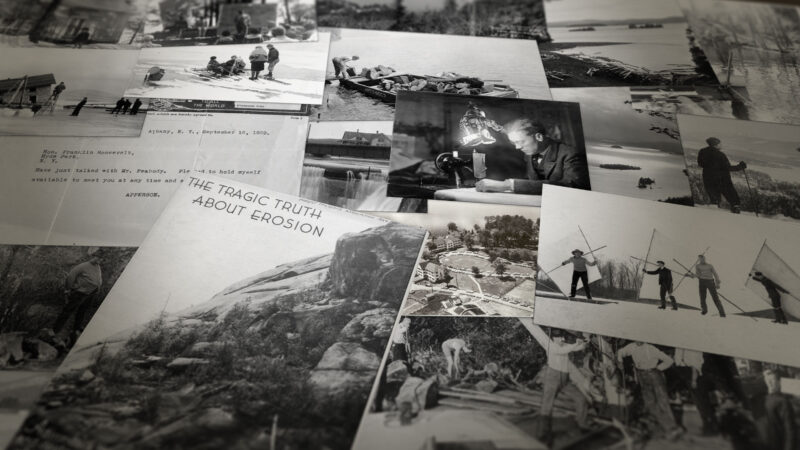- June 15, 1954 – Alvin Whitney (TNC Washington, DC) to Dr. Irving Langmuir
Dear Dr. Langmuir:
During the Forest Preserve Association meeting on May 26 you expressed interest in the progress of the Nature Conservancy and our Eastern New York Chapter which was chartered last January. I’ve intended to write you further about it, though you may already have received some material from Dr. Caldwell, chairman of the chapter. As you probably know, the Nature Conservancy is “an independent, member-governed organization, incorporated in the District of Columbia for non-profit educational and scientific purposes.” Its objectives are to encourage the acquisition and preservation of wild land areas such as outstanding scenery, virgin or old growth forests, or associations of rare or vanishing species of plants and animals.
The objective of the Conservancy is 1) to preserve such areas as sanctuaries, to be maintained strictly unmodified and undisturbed for all time; 2) to use these lands for scientific and educational purposes, without impairment. Some partly modified or abused areas are still valuable for restoration to as nearly original condition as possible, and are therefore considered for acquisition.
The Nature Conservancy is empowered to acquire and administer lands for these purposes under trust agreements, and areas in a number of states have been set aside under various agreements, or are in process of acquisition by purchase or donation. In New York we have in prospect several fine natural areas in various stages of study or acquisition, through efforts either of local committees; the Eastern New York Chapter; or “Wildlife Reserves, Inc.” an intermediary in metropolitan New York. Funds are being raised either for purchase, or in cases where the lands are donated, for protection and permanent maintenance.
One of the most striking cases of a natural area cherished and preserved through the efforts of the owner over a long period, is Dome Island in Lake George; a scenic treasure unique in the charm of its undisturbed forest and its beautiful silhouette at all seasons and in all weathers. Obviously the “scenic centerpiece,” formed by glacial action, should continue to be preserved in its strictly original condition for its esthetic beauty alone. And as Mr. Apperson is desirous of transferring it to an agency prepared to maintain it unimpaired in perpetuity, the Nature Conservancy is the logical organization to undertake this responsibility.
The Conservancy is definitely interested in keeping Dome Island and inviolate reserve for educational, scientific and esthetic uses. And if after due negotiation it should agree to take title to the property, it would use it for purely ecological studies such as would be carried on without disturbing the natural conditions; for a control area in comparison with other islands already modified and deteriorating from varied developments; and for an educational program consistent with the primary objective of preserving a scenic masterpiece. The possibilities of educational use, under necessary restrictions as to access and wear, are limited only by the funds available for promoting right attitudes and appreciation for natural areas, using this land as an example.
Assuming that this is a practical program, I feel that we who are interested in the project should proceed without further delay to set up a committee to promote it, and to raise funds deemed necessary to meet the costs of protection and maintenance, and such educational activities as may seem warranted. When this has been accomplished, I feel sure the Nature Conservancy will be willing to take over, under a trust agreement, with mutual safeguards to be arranged. In behalf of the Conservancy, as their representative for New York State, I wish to invite you to head a committee to enlist support for the project, the members to be selected by you, with the provision that they carry on the actual work.
We have in Dome Island an ennobling influence on thousands of people who see it every year, who just take it for granted, but who would sorely feel its loss. Its preservation in trust by an appropriate and permanent organization seems imperative. I hope you feel that some definite action to this end may be taken very soon. Yet I do hesitate to burden you, though aware of your deep interest.
Very truly yours,
Alvin G. Whitney
